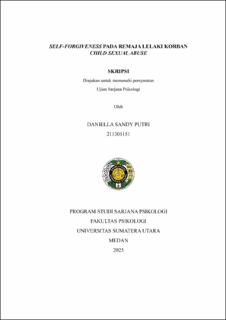| dc.contributor.advisor | Tuapattinaja, Josetta Maria Remila | |
| dc.contributor.author | Putri, Daniella Sandy | |
| dc.date.accessioned | 2025-08-08T01:17:27Z | |
| dc.date.available | 2025-08-08T01:17:27Z | |
| dc.date.issued | 2025 | |
| dc.identifier.uri | https://repositori.usu.ac.id/handle/123456789/108057 | |
| dc.description.abstract | Child sexual abuse is a traumatic experience that causes deep emotional turmoil, especially for adolescent boys who also face the pressures of a rigid masculinity culture and identity crisis. This study aims to understand the dynamics of self-forgiveness in adolescent male victims of sexual violence as an important step in post-traumatic recovery, especially when they are faced with feelings of shame, guilt, and stigma.
This study uses a qualitative approach with a phenomenological method. Data are
analyzed thematically based on the four phases of self-forgiveness according to
Enright, namely uncovering, decision, work, and deepening.
This research indicates that self-forgiveness in adolescent male survivors of child sexual abuse is a complex and diverse process in their recovery. The study highlights the integration of the self-forgiveness process into a strong self-identity, leading to self-acceptance and positive emotional growth. | en_US |
| dc.language.iso | id | en_US |
| dc.publisher | Universitas Sumatera Utara | en_US |
| dc.subject | Self-Forgiveness | en_US |
| dc.subject | Male Adolescent | en_US |
| dc.subject | Child Sexual Abuse | en_US |
| dc.title | Self-Forgiveness pada Remaja Lelaki Korban Child Sexual Abuse | en_US |
| dc.title.alternative | Self-Forgiveness in Male Adolescent Victims of Child Sexual Abuse | en_US |
| dc.type | Thesis | en_US |
| dc.identifier.nim | NIM211301151 | |
| dc.identifier.nidn | NIDN0030126202 | |
| dc.identifier.kodeprodi | KODEPRODI73201#Psikologi | |
| dc.description.pages | 194 Pages | en_US |
| dc.description.type | Skripsi Sarjana | en_US |
| dc.subject.sdgs | SDGs 3. Good Health And Well Being | en_US |


